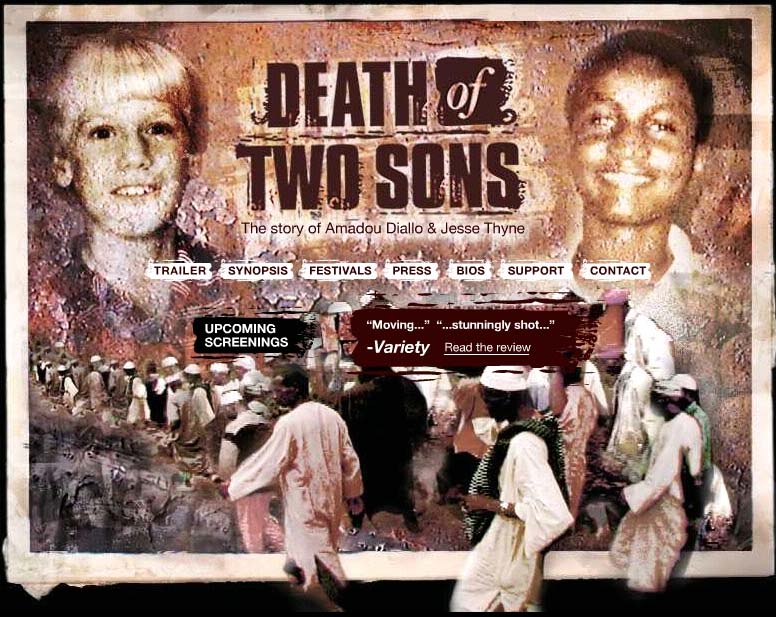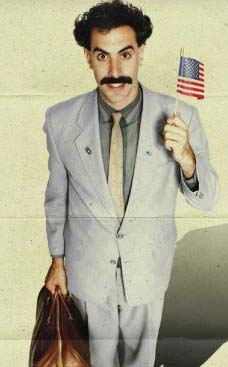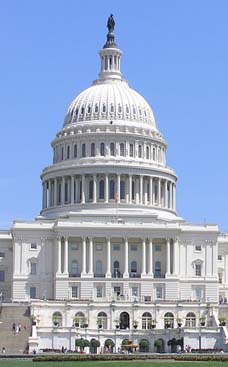2006.08.02: August 2, 2006: Headlines: COS - Guinea: Fallen: Movies: Documentaries: African American Issues: Police: Variety: RPCV Micah Schaffer has produced a feature length documentary called Death of Two Sons about Amadou Diallo's slaying and the car-crash death of Peace Corps volunteer Jesse Thyne, an American who lived with Diallo's family in Guinea
Peace Corps Online:
Directory:
Guinea:
Peace Corps Guinea :
The Peace Corps in Guinea:
2006.08.02: August 2, 2006: Headlines: COS - Guinea: Fallen: Movies: Documentaries: African American Issues: Police: Variety: RPCV Micah Schaffer has produced a feature length documentary called Death of Two Sons about Amadou Diallo's slaying and the car-crash death of Peace Corps volunteer Jesse Thyne, an American who lived with Diallo's family in Guinea
RPCV Micah Schaffer has produced a feature length documentary called Death of Two Sons about Amadou Diallo's slaying and the car-crash death of Peace Corps volunteer Jesse Thyne, an American who lived with Diallo's family in Guinea

Micah Schaffer's moving, stunningly shot documentary juxtaposes the deaths of a Guinean in America and an American in Guinea. The Guinean in "Death of Two Sons" was Amadou Diallo, senselessly gunned down by four New York City policemen with 41 bullets. The American was Peace Corps volunteer Jesse Thyne, who lived with Amadou's family in Guinea and died in a car crash there. The two men never met, but their destinies are intertwined in this unique film. Jesse's California family is mainly represented by his father, Rick, whose generosity spiritually allies him to the indomitable Kadiatou Diallo, Amadou's mother. Though the film contains TV coverage of the spontaneous protests that arose after Amadou's death, and many of his kinsmen weigh in on the injustice of the absence of punishment meted out to his killers (in contrast, the Guinean taxi driver whose speeding contributed to the accident killing Jesse was sentenced to three years in jail), it is Jesse's father who delivers the most telling political indictment: He states his son's death was a tragedy, but Amadou's was also a travesty caused by the "worst of our armed, racist, hostile culture."
RPCV Micah Schaffer has produced a feature length documentary called Death of Two Sons about Amadou Diallo's slaying and the car-crash death of Peace Corps volunteer Jesse Thyne, an American who lived with Diallo's family in Guinea
Death of Two Sons
(Documentary)
By RONNIE SCHEIB
'Death of Two Sons'
Peace Corps volunteer Jesse Thyne, joined the Diallo family in Guinea at the same time the fated Amadou Diallo lived in New York.
An HBO Life Through Your Lens Program/Harvard U. Dept. of African and Afro-American Studies/AOL-Time Warner/Two Sons Films production. Produced by Alrick Brown, Micah Schaffer. Co-producer, Gabriel Noble. Directed by Micah Schaffer.
With: Kadiatou Diallo, Mamadou Korka Diallo, Rick Thyne, Modi Oury Diallo, Alpha Omar Diallo, Jean Simmons.
(French, English, Pulaar dialogue)
Micah Schaffer's moving, stunningly shot docu juxtaposes the deaths of a Guinean in America and an American in Guinea. The Guinean in "Death of Two Sons" was Amadou Diallo, senselessly gunned down by four New York City policemen with 41 bullets. The American was Peace Corps volunteer Jesse Thyne, who lived with Amadou's family in Guinea and died in a car crash there. The two men never met, but their destinies are intertwined in this unique film. Though partly financed by HBO, this striking docu still lacks a distributor.
Helmer Schaffer never allows the exposition of the interviewees to overwhelm the visual aspects of the storytelling as Amadou's extended family describes him as a well-traveled "child of privilege" who spoke several languages and took over as man-of-the-house after his parents' separation. As Amadou's nearest and dearest talk about his about-to-be-realized dream of making enough money in America to attend college there, their expressions and gestures make the immigrant victim come alive to viewers.
These same Diallo family members next tell of Jesse and his willingness to become part of their community. He fasted on Ramadan with them and spoke their language. Jesse translated Amadou's funeral for American journalists.
Clearly, in the minds of the villagers of Diountou, Amadou and Jesse's deaths were mystically conjoined, a connection the film maintains by artfully intercutting between aesthetically matched milieus.
Jesse's California family is mainly represented by his father, Rick, whose generosity spiritually allies him to the indomitable Kadiatou Diallo, Amadou's mother. Though the film contains TV coverage of the spontaneous protests that arose after Amadou's death, and many of his kinsmen weigh in on the injustice of the absence of punishment meted out to his killers (in contrast, the Guinean taxi driver whose speeding contributed to the accident killing Jesse was sentenced to three years in jail), it is Jesse's father who delivers the most telling political indictment: He states his son's death was a tragedy, but Amadou's was also a travesty caused by the "worst of our armed, racist, hostile culture."
Pic freely intercuts between New York, California and Guinea, doing full justice to contrasts in the colors, rhythms and zeitgeists of each location, perhaps even editorializing a bit through pictorial means.
Cary Fukunaga's superlative 24p video lensing depicts New York City as a cold, bleached-out site where distinguished African-American statesmen are led off in handcuffs while the four policemen responsible for the questionable shooting get off scot-free.
In contrast, both California and Guinea are shown as warm, family-friendly home places, the rituals of the candle-filled church where Jesse's father was a pastor mirrored by the candle-lit Muslim rites in Diountou.
Camera (color, DV), Cary Fukunaga; editors, Dena Mermelstein, Martha Skolnik; music supervisor, Matt Rocker; sound, Alrick Brown, Scott Jones. Reviewed at Urbanworld Film Festival, New York, June 24, 2006. Running time: 64 MIN.
Links to Related Topics (Tags):
Headlines: August, 2006; Peace Corps Guinea; Directory of Guinea RPCVs; Messages and Announcements for Guinea RPCVs; Fallen; Movies; Documentary Films; African American Issues; Police
When this story was posted in December 2006, this was on the front page of PCOL:





Peace Corps Online The Independent News Forum serving Returned Peace Corps Volunteers
 | All Volunteers Safe in Fiji
All Volunteers in Fiji are safe and accounted for. The Peace Corps is monitoring the situation very closely. Volunteers are on standfast but there are no plans for evacuation at this time. Peace Corps is working closely with the US embassy and with host country partners to monitor the situation. Peace Corps is confident that volunteers are not in harm's way. The military seized control of Fiji on December 5 after weeks of threats. Subscribe to our news feed to read the latest breaking news. |
 | Ron Tschetter in Morocco and Jordan
On his first official trip since being confirmed as Peace Corps Director, Ron Tschetter (shown at left with PCV Tia Tucker) is on a ten day trip to Morocco and Jordan. Traveling with his wife (Both are RPCVs.), Tschetter met with volunteers in Morocco working in environment, youth development, health, and small business development. He began his trip to Jordan by meeting with His Majesty King Abdullah II and Her Majesty Queen Rania Al Abdullah and discussed expanding the program there in the near future. |
 | Chris Dodd's Vision for the Peace Corps
Senator Chris Dodd (RPCV Dominican Republic) spoke at the ceremony for this year's Shriver Award and elaborated on issues he raised at Ron Tschetter's hearings. Dodd plans to introduce legislation that may include: setting aside a portion of Peace Corps' budget as seed money for demonstration projects and third goal activities (after adjusting the annual budget upward to accommodate the added expense), more volunteer input into Peace Corps operations, removing medical, healthcare and tax impediments that discourage older volunteers, providing more transparency in the medical screening and appeals process, a more comprehensive health safety net for recently-returned volunteers, and authorizing volunteers to accept, under certain circumstances, private donations to support their development projects. He plans to circulate draft legislation for review to members of the Peace Corps community and welcomes RPCV comments. |
 | He served with honor
One year ago, Staff Sgt. Robert J. Paul (RPCV Kenya) carried on an ongoing dialog on this website on the military and the peace corps and his role as a member of a Civil Affairs Team in Iraq and Afghanistan. We have just received a report that Sargeant Paul has been killed by a car bomb in Kabul. Words cannot express our feeling of loss for this tremendous injury to the entire RPCV community. Most of us didn't know him personally but we knew him from his words. Our thoughts go out to his family and friends. He was one of ours and he served with honor. |
 | Peace Corps' Screening and Medical Clearance
The purpose of Peace Corps' screening and medical clearance process is to ensure safe accommodation for applicants and minimize undue risk exposure for volunteers to allow PCVS to complete their service without compromising their entry health status. To further these goals, PCOL has obtained a copy of the Peace Corps Screening Guidelines Manual through the Freedom of Information Act (FOIA) and has posted it in the "Peace Corps Library." Applicants and Medical Professionals (especially those who have already served as volunteers) are urged to review the guidelines and leave their comments and suggestions. Then read the story of one RPCV's journey through medical screening and his suggestions for changes to the process. |
 | The Peace Corps is "fashionable" again
The LA Times says that "the Peace Corps is booming again and "It's hard to know exactly what's behind the resurgence." PCOL Comment: Since the founding of the Peace Corps 45 years ago, Americans have answered Kennedy's call: "Ask not what your country can do for you--ask what you can do for your country. My fellow citizens of the world: ask not what America will do for you, but what together we can do for the freedom of man." Over 182,000 have served. Another 200,000 have applied and been unable to serve because of lack of Congressional funding. The Peace Corps has never gone out of fashion. It's Congress that hasn't been keeping pace. |
 | PCOL readership increases 100%
Monthly readership on "Peace Corps Online" has increased in the past twelve months to 350,000 visitors - over eleven thousand every day - a 100% increase since this time last year. Thanks again, RPCVs and Friends of the Peace Corps, for making PCOL your source of information for the Peace Corps community. And thanks for supporting the Peace Corps Library and History of the Peace Corps. Stay tuned, the best is yet to come. |
 | History of the Peace Corps
PCOL is proud to announce that Phase One of the "History of the Peace Corps" is now available online. This installment includes over 5,000 pages of primary source documents from the archives of the Peace Corps including every issue of "Peace Corps News," "Peace Corps Times," "Peace Corps Volunteer," "Action Update," and every annual report of the Peace Corps to Congress since 1961. "Ask Not" is an ongoing project. Read how you can help. |
Read the stories and leave your comments.

Some postings on Peace Corps Online are provided to the individual members of this group without permission of the copyright owner for the non-profit purposes of criticism, comment, education, scholarship, and research under the "Fair Use" provisions of U.S. Government copyright laws and they may not be distributed further without permission of the copyright owner. Peace Corps Online does not vouch for the accuracy of the content of the postings, which is the sole responsibility of the copyright holder.
Story Source: Variety
This story has been posted in the following forums: : Headlines; COS - Guinea; Fallen; Movies; Documentaries; African American Issues; Police
PCOL35285
64



















